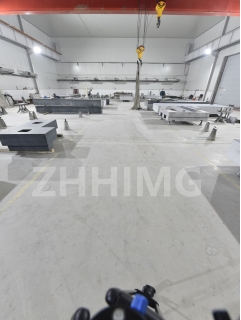Judging production capacity
Equipment and technology
Processing equipment: Check whether the factory has advanced and complete processing equipment, such as large CNC cutting machines, grinding machines, polishing machines, engraving machines, etc. Advanced equipment can not only improve production efficiency, but also ensure processing accuracy and quality. For example, CNC cutting machines can precisely cut granite to preset sizes and shapes, reducing material waste and manual error.
Technical process: understand the processing technology and process used by the factory, such as stone cutting process, splicing process, surface treatment process, etc. Mature and advanced processes produce high quality products and reflect the technical strength of the plant. For example, the use of high-precision water knife cutting process can cut out complex shapes and patterns, and a good splicing process can make the splicing seamless, firm and beautiful.
Production scale
Plant area: A larger plant area usually means that there is more space for equipment placement, raw material storage and product processing, which can accommodate more production lines and thus have higher production capacity. You can get an idea of the size of the plant by visiting the site or viewing photos and videos of the factory.
Number of employees: The number of employees is also an important indicator of production capacity. Including skilled technical workers, management and sales personnel. Sufficient staff can ensure the smooth progress of all production links and improve production efficiency. For example, experienced technical workers can operate equipment quickly and accurately to ensure product quality; And professional managers can reasonably arrange production plans to improve production efficiency.
Design capability
Professional designers: Inspect whether the factory has a professional design team, whether the designer has rich stone design experience and innovation ability. Professional designers can provide personalized design solutions according to customer needs.
Communication and collaboration skills
Customer communication: In the process of communicating with the factory's non-standard customized needs, observe whether its sales staff and technical staff can carefully listen to the needs of customers, timely and accurately answer customer questions, and provide professional advice and solutions. Good communication skills can ensure that the needs of customers are fully understood and met, and avoid the occurrence of customized products that do not meet the requirements due to poor communication.
Internal collaboration: Understand the cooperation between various departments within the factory, such as whether the design department, production department and quality control department can cooperate closely to ensure the smooth progress of all aspects of non-standard customized products from design to production and inspection. Efficient internal collaboration can improve production efficiency and shorten lead times for customized products.
Post time: Mar-28-2025

